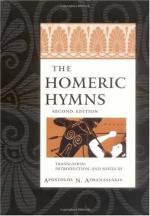“Father, anon shalt thou hear no empty tale; tauntest thou me, as though I were the only lover of booty? This boy have I found, a finished reiver, in the hills of Cyllene, a long way to wander; so fine a knave as I know not among Gods or men, of all robbers on earth. My kine he stole from the meadows, and went driving them at eventide along the loud sea shores, straight to Pylos. Wondrous were the tracks, a thing to marvel on, work of a glorious god. For the black dust showed the tracks of the kine making backward to the mead of asphodel; but this child intractable fared neither on hands nor feet, through the sandy land, but this other strange craft had he, to tread the paths as if shod on with oaken shoots. {153} While he drove the kine through a land of sand, right plain to discern were all the tracks in the dust, but when he had crossed the great tract of sand, straightway on hard ground his traces and those of the kine were ill to discern. But a mortal man beheld him, driving straight to Pylos the cattle broad of brow. Now when he had stalled the kine in quiet, and confused his tracks on either side the way, he lay dark as night in his cradle, in the dusk of a shadowy cave. The keenest eagle could not have spied him, and much he rubbed his eyes, with crafty purpose, and bluntly spake his word:
“I saw not, I heard not aught, nor learned another’s tale; nor tidings could I give, nor win reward of tidings.”
Therewith Phoebus Apollo sat him down, but another tale did Hermes tell, among the Immortals, addressing Cronion, the master of all Gods:
“Father Zeus, verily the truth will I tell thee: for true am I, nor know the way of falsehood. To-day at sunrise came Apollo to our house, seeking his shambling kine. No witnesses of the Gods brought he, nor no Gods who had seen the fact. But he bade me declare the thing under duress, threatening oft to cast me into wide Tartarus, for he wears the tender flower of glorious youth, but I was born but yesterday, as well himself doth know, and in naught am I like a stalwart lifter of kine. Believe, for thou givest thyself out to be my father, that may I never be well if I drove home the kine, nay, or crossed the threshold. This I say for sooth! The Sun I greatly revere, and other gods, and Thee I love, and him I dread. Nay, thyself knowest that I am not to blame; and thereto I will add a great oath: by these fair-wrought porches of the Gods I am guiltless, and one day yet I shall avenge me on him for this pitiless accusation, mighty as he is; but do thou aid the younger!”
So spake Cyllenian Argus-bane, and winked, with his wrapping on his arm: he did not cast it down. But Zeus laughed aloud at the sight of his evil-witted child, so well and wittily he pled denial about the kine. Then bade he them both be of one mind, and so seek the cattle, with Hermes as guide to lead the way, and show without guile where he had hidden the sturdy kine. The Son of Cronos nodded, and glorious Hermes obeyed, for lightly persuadeth the counsel of Zeus of the AEgis.




